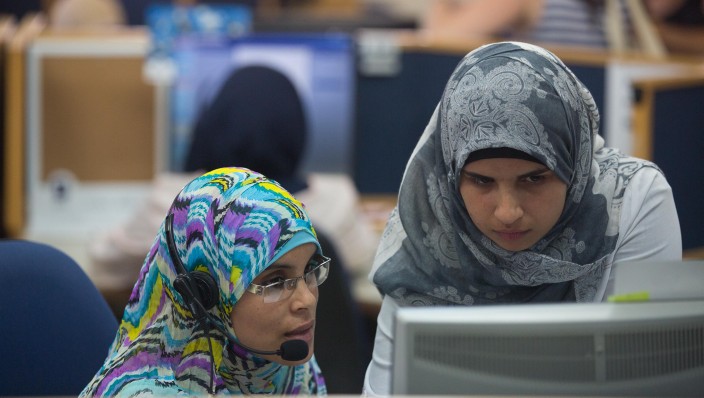IN THE MEDIA
UN claims on Palestinian women invert the truth
August 8, 2019 | Tzvi Fleischer

Australian Jewish News – 8 August 2019
The UN has produced another one of the anti-Israel absurdities for which it has become infamous. On July 23, the UN’s 54-nation Economic and Social Council voted 40-2, with 9 abstentions, to single out Israel as the only state in the world branded as a violator of women’s rights. Among those who voted in favour were such paragons of women’s rights as Saudi Arabia, Iran, Pakistan, and Yemen (Australia is not a member).
Most of the long resolution said nothing about women but simply parroted generic UN anti-Israel rhetoric, accusing the Jewish state of numerous crimes, but the key clause condemned Israel and the “occupation” as “a major obstacle for Palestinian women and girls with regard to the fulfilment of their rights, and their advancement, self-reliance and integration in the development of their society.”
Of course, the resolution did not mention how Palestinian women’s rights are impacted by their own governing authorities—the Palestinian Authority and Hamas. These surely have the primary responsibility for progressing the “advancement, self-reliance and integration” of the Palestinian women of the West Bank and Gaza respectively.
Yet with regard to the situation of the Palestinian women who are citizens of Israel, recent years have seen achievements which make a mockery of the UN’s claims. A decade ago only 22% of Israeli Arab women were working outside their homes. Today, that number is more than 40% (admittedly, this is still way below the workforce participation rate of Jewish Israeli women, who have one of the highest participation rates in the OECD).
The jump in employment rates among Israeli Arab women is in part the result of deliberate Israeli Government policy. The Israeli Government has set a target of 54% employment for Arab women by 2030. To help achieve that goal, they have been improving public transport to Arab villages so women can reach jobs, building industrial zones in large Arab towns like Nazareth that can offer employment closer to Arab villages and have set up 22 employment centres specifically for Arab women to help match them with available jobs.
Admittedly, serious problems remain. Nasreen Hadad Haj Yahya, director of the Arab-Jewish Relations Program at the Israel Democracy Institute, noted to the Jerusalem Post that one key barrier to further increasing the employment rate among Israeli Arab women is lack of adequate education. She pointed out that there is still a funding gap between the Arab and Jewish school systems in Israel and that, among young Arab women ages 18-22, almost half are neither working nor studying.
However, a 2018 study found that Israeli Arab women are today succeeding on the bagrut high school matriculation exam in proportions approaching those of non-ultra-Orthodox Jewish women. Moreover, Arab Israeli women are choosing science and engineering majors in high school subjects at higher rates than their Jewish countrywomen.
Furthermore, Haj Yahya also noted to the Jerusalem Post that Arab citizens today make up about 17% of university students in Israel, which is close to their 20% proportion of the population – a significant improvement compared to the situation a decade ago. Of those Arab students, 70% are women – who will of course largely want to enter the workforce and expect their daughters to work in the future.
The achievements of individual Israeli Arab women also help underline how Israeli government policies are actually doing a great deal for the “advancement, self-reliance and integration” of Israeli Arab women, as well as creating some great role models for Israeli Arab girls.
Examples include Dr. Shaden Salameh, just appointed the first Arab female physician to head up a hospital emergency room in Israel at Hadassah Hospital Mount Scopus, and Prof. Mona Khoury-Kassabri, who became the first Israeli Arab woman to serve as a dean of an Israeli University when she was appointed dean of the Hebrew University’s School of Social Work last year (she is due to visit Australia in October).
Meanwhile, Superintendent Luba Samri has served as one of the top spokespersons for the Israeli police, while Lucy Aharish has long been a major figure in Israeli TV current affairs, and another Lucy prominent in television broadcasting, Lucy Ayoub, was co-host of the Eurovision song contest in Tel Aviv earlier this year.
By comparison, the Palestinian Authority continues to hold up terrorists as the key role models for young women, with numerous institutions, sporting events, camps and schools named after Dalal Mughrabi – leader of a terrorist cell which murdered 37 civilians in 1978. Other female terrorists publicly honoured by the PA include hijacker Laila Khaled and suicide bomber Wafa Idris and Ayyat Al-Akhras.
Meanwhile, in Gaza, Hamas’ idea of encouraging the“advancement, self-reliance and integration” of Palestinian women appears to be to force them to wear hijabs (headscarves) and to use the security forces to police their interactions with members of the opposite sex.
The truth is, if the UN was interested in facts and fairness, instead of singling out Israel for condemnation, it would make more sense to single out Israel for praise over its positive efforts to progress the “advancement, self-reliance and integration” of its female Palestinian citizens.
Dr. Tzvi Fleischer is Editor of the Australia/Israel Review at the Australia/Israel & Jewish Affairs Council.
Tags: Israel, United Nations, Women





